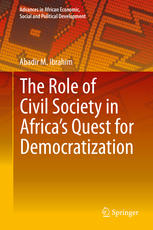

Most ebook files are in PDF format, so you can easily read them using various software such as Foxit Reader or directly on the Google Chrome browser.
Some ebook files are released by publishers in other formats such as .awz, .mobi, .epub, .fb2, etc. You may need to install specific software to read these formats on mobile/PC, such as Calibre.
Please read the tutorial at this link: https://ebookbell.com/faq
We offer FREE conversion to the popular formats you request; however, this may take some time. Therefore, right after payment, please email us, and we will try to provide the service as quickly as possible.
For some exceptional file formats or broken links (if any), please refrain from opening any disputes. Instead, email us first, and we will try to assist within a maximum of 6 hours.
EbookBell Team

4.4
82 reviewsThis book tests many of the assumptions, hypotheses, and conclusions connected with the presumed role of civil society organizations in the democratization of African countries. Taking a comparative approach, it looks at countries that have successfully democratized, those that are stuck between progress and regression, those that have regressed into dictatorship, and those that are currently in transitional flux and evaluates what role, if any, civil society has played in each instance. The countries discussed—South Africa, Ghana, Nigeria, Ethiopia, Egypt and Tunisia—represent a diverse set of social and political circumstances and different levels of democratic achievement, providing a rich set of case studies. Each sample state also offers an internal comparison, as each has historically experienced different stages of democratization. Along the course of each case study, the book also considers the effect that other traditionally studied factors, such as culture, colonization, economic development and foreign aid, may have had on individual attempts at democratization. The first extensive work on civil society and democratization in Africa, the book adds new insights to the applicability of democratization theory in a non-Western context, both filling a gap in and adding to the existing universal scholarship. This book will be useful for scholars of political science, economics, sociology and African studies, as well as human rights activists and policy makers in the relevant geographical areas.